With the IISER mock test free attempts, you get the opportunity to get familiar with the format, structure, question types, etc. You can access this high-quality practice material whether you are in the final stages of preparation or are just looking to assess your progress.
Overview Of The Indian Institute Of Science Education And Research Aptitude Test
The table given below provides you with the important information related to the Indian Institute of Science Education and Research Aptitude Test which is popularly known as the IISER Entrance Exam.
|
ASPECT |
DETAILS |
|
Exam Name |
IAT: IISER Aptitude Test |
|
Conducting Body for the Exam |
IISER: Indian Institute of Science Education and Research |
|
Exam Level |
Undergraduate |
|
Frequency of the Exam |
Annual |
|
Exam Mode |
Online: Computer-Based Test |
|
Courses Offered through IAT |
BS-MS Dual Degree Program and BS Degree Program (IISER, Bhopal) |
|
Official Website |
Subject-Wise IISER Mock Test Free
On our digital platform, you get to attempt the IAT mock test for every subject separately. With the help of this feature, you will be able to enhance your problem-solving skills in Physics, Chemistry, Biology, and Maths in an effective manner. You can also learn to manage time properly across all the sections in the exam. We recommend that you attempt these mock test series throughout your preparation. The direct links to the mock tests are mentioned below for easy access.
IAT Mock Test With Solutions To The Questions
The IISER mock test 2025 includes all the accurate solutions with detailed explanations of the questions. They will be available once you have attempted the given questions and submitted the test on our website. By going through these solutions, you can learn the underlying principles of the problems. The step-by-step explanations also help you to understand the correct way of approaching the questions.
Pattern Of The IISER Aptitude Test
In this section, we have mentioned the details about the pattern of the IISER Aptitude Test so that you can understand it clearly.
|
PARTICULARS |
DETAILS |
|
Duration of the Test |
180 minutes |
|
Total Number of Questions |
60 questions
|
|
Type of Questions |
Multiple-choice questions with only one correct answer. |
|
Marking Scheme |
|
|
Maximum Marks |
240 marks |
How To Attempt The IISER Mock Test 2025 On SelfStudys?
The mock test for IISER on our platform can be attempted simply by reading and following the steps that are given below.
- The homepage of SelfStudys will open up once you type www.selfstudys.com on your preferred web browser.

- Now, here, you have to click on the ‘Navigation’ icon to open the main menu.
- In this menu, you can check out the list of categories and select the ‘JEE’ section.
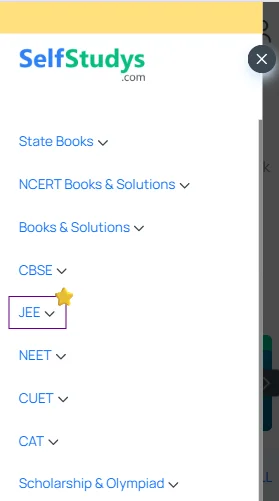
- Under the JEE section, you should locate and tap on the ‘IISER mock test’ option.
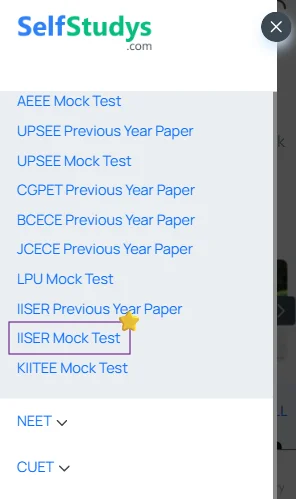
- Then, a new web page will be displayed on your screen that includes the IISER online mock test free for all the subjects.
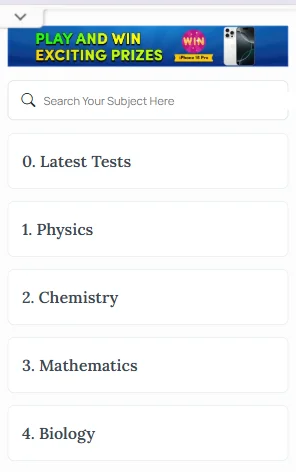
- You can select any subject to open its specific list of IAT mock test series and attempt them one by one to enhance your skills.
Note: You will only get the result of the questions that you attempted in the IISER mock test free after Logging In or Signing Up on SelfStudys with your Google account.
Syllabus Of The Mock Test For IISER
Below is a table in which we have described the entire syllabus of the IISER Entrance Exam. Our experts also design the IAT mock test by creating the questions from the same topics of the syllabus.
|
SUBJECT |
TOPICS |
|
PHYSICS |
Units and Measurements: The international system of units; Significant figures; Dimensions of physical quantities; Dimensional formulae and dimensional equations. Motion in a Straight Line: Instantaneous velocity and speed; Acceleration; Kinematic equations for uniformly accelerated motion. Motion in a Plane: Scalars and vectors; Multiplication of vectors by real numbers; Addition and subtraction of vectors – graphical method. Laws of Motion: The law of inertia; Newtons' first law of motion; Newtons' second law of motion; Newtons' third law of motion; Conservation of momentum. Work, Energy, and Power: Notions of work and kinetic energy: The work-energy theorem; Work; Kinetic energy; Work done by a variable force. System of Particles and Rotational Motion: Centre of mass; Motion of center of mass; Linear momentum of a system of particles; Vector product of two vectors; Angular velocity and its relation with linear velocity. Gravitation: Kepler’s laws; Universal law of gravitation; The gravitational constant; Acceleration due to gravity of the earth; Acceleration due to gravity below and above the surface of the earth. Mechanical Properties of Solids: Stress and strain; Hooke’s law; Stress-strain curve; Elastic moduli; Applications of elastic behavior of materials. Mechanical Properties of Fluids: Pressure; Streamline flow; Bernoulli’s principle; Viscosity; Surface tension. Thermal Properties of Matter: Temperature and heat; Measurement of temperature; Ideal-gas equation and absolute temperature; Thermal expansion; Specific heat capacity; Calorimetry; Change of state; Heat transfer; Newton’s law of cooling. Thermodynamics: Thermal equilibrium; Zeroth law of thermodynamics; Heat, internal energy, and work; First law of thermodynamics; Specific heat capacity; Thermodynamic state variables and equation of state; Thermodynamic processes; Second law of thermodynamics; Reversible and irreversible processes; Carnot engine. Kinetic Theory: Molecular nature of matter; Behaviour of gases; Kinetic theory of an ideal gas; Law of equipartition of energy; Specific heat capacity; Mean free path. Oscillations: Periodic and oscillatory motions; Simple harmonic motion; Simple harmonic motion and uniform circular motion; Velocity and acceleration in simple harmonic motion. Waves: Transverse and longitudinal waves; Displacement relation in a progressive wave; The speed of a traveling wave; The principle of superposition of waves; Reflection of waves; Beats. |
|
CHEMISTRY |
Some Basic Concepts of Chemistry: Matter and its nature, Dalton's atomic theory: Concept of atom, molecule, element, and compound, Laws of chemical combination, Atomic and molecular masses, mole concept, molar mass, and percentage composition. Structure of the Atom: Discovery of Sub-atomic Particles, Atomic Models, Developments Leading to Bohr’s Model of Atom, Bohr’s Model for Hydrogen Atom. Classification of Elements and Periodicity in Properties: Genesis of Periodic Classification, Modern Periodic Law and the Present Form of the Periodic Table, Electronic Configurations of Elements and the Periodic Table. Chemical Bonding and Molecular Structure: Kössel-Lewis Approach to Chemical Bonding, Ionic or Electrovalent Bond, Bond Parameters, The Valence Shell Electron Pair Repulsion (VSEPR) Theory. Coordination Compounds: Werner's Theory of Coordination Compounds, Definitions of Some Important Terms Pertaining to Coordination Compounds, Nomenclature of Coordination Compounds. Thermodynamics: Thermodynamic Terms, Measurement of ΔU and ΔH, Calorimetry, Enthalpy Change, ΔH of a Reaction. Equilibrium: Equilibrium in Physical Processes, Equilibrium in Chemical Processes – Dynamic Equilibrium, Law of Chemical Equilibrium and Equilibrium Constant, Homogeneous Equilibria. Redox Reactions: Classical Idea of Redox Reactions-Oxidation and Reduction Reactions, Redox Reactions in Terms of Electron Transfer Reactions, Oxidation Number, Redox Reactions and Electrode Processes. Electrochemistry: Electrochemical Cells, Galvanic Cells, Nernst Equation, Conductance of Electrolytic Solutions, Electrolytic Cells and Electrolysis, Batteries, Fuel Cells, Corrosion. Chemical Kinetics: Rate of a Chemical Reaction, Factors Influencing Rate of a Reaction, Integrated Rate Equations, Temperature Dependence of the Rate of a Reaction, Collision Theory of Chemical Reactions. Organic Chemistry – Some Basic Principles and Techniques: General Introduction, Tetravalence of Carbon: Shapes of Organic Compounds, Structural Representations of Organic Compounds, Classification of Organic Compounds. Hydrocarbons: Classification, Alkanes, Alkenes, Alkynes, Aromatic Hydrocarbon, Carcinogenicity and Toxicity. Biomolecules: Carbohydrates, Proteins, Enzymes, Vitamins, Nucleic Acids, Hormones. |
|
MATHEMATICS |
Sets and Logic: Representing sets in different ways. Subsets. Different types of sets e.g. universal sets, finite or infinite sets, and intervals in real line. Type of relations. Equivalence relation. Functions. Types of functions. Composition of functions, inverse of a function. Permutations and Combinations: Fundamental principles of counting. Factorial n. Permutations and combinations- derivation of formulae and their connections. Binomial Theorem: Binomial theorem for positive integral indices. Pascal’s triangle. Complex Numbers: Motivation for complex numbers. Representation of complex numbers in the plane as a pair of real numbers and their representation of the form a+ib. Polar representation and the Argand plane. Quadratic Equations: Quadratic equations and their solutions. Relation between roots and the coefficients of quadratic equations. Linear Inequalities: Inequalities, Algebraic solution of linear inequalities in one variable and their graphical representation. Trigonometric functions: Measures of angles and their conversions. Trigonometric functions, identities, and their geometric interpretations. Applications of trigonometric equations. Vectors: Vectors and scalars. Magnitude and direction of a vector. Direction cosines/ ratios. Types of vectors. Position vector. Three-dimensional geometry: Coordinate axes and planes. Distance between points. Section formula. Direction cosines and direction ratios of a line. Various forms of the equation of a line. The angle between two lines and two planes. Sequences & series: Arithmetic and Geometric progressions. Sums of finite and infinite geometric series. Sums of finite terms in arithmetic series. Arithmetic mean (A.M.) and geometric mean (G.M.). Limit & continuity Limits. Continuity. Algebraic properties of limits. Algebraic properties of continuous functions. Limits and continuity of real-valued functions. Integration: Integration is the inverse process of differentiation. Integrals involving algebraic, trigonometric, exponential, and logarithmic functions. Integration of a variety of functions by substitution, by partial fractions. |
|
BIOLOGY |
The living world: The Diversity in the living world, Taxonomic categories. Biological classification: Kingdoms (Monera, Protista, Fungi, Plantae, and Animalia), Viruses, Viroids, and Lichens. Plant kingdom: Algae, Bryophytes, Pteridophytes, Gymnosperms, Angiosperms. Animal kingdom: Basis of classification of animals and Classification of Animals. Morphology of flowering plants: The Root, The Stem, The Leaf, The Inflorescence, The Flower, The Fruit, The Seed. Anatomy of flowering plants: The Tissue System, Anatomy of Dicotyledonous and Monocotyledonous Plants. Structural organization in animals: Organ and Organ System, Amphibian-Frog. Cell: the unit of life: A Cell, The Cell Theory, An Overview of Cell, Prokaryotic Cells, Eukaryotic Cells. Biomolecules: Analysis of Chemical Composition of organisms, Primary and Secondary Metabolites, Biomacromolecules, Proteins, Polysaccharides, Nucleic Acids, Structure of Proteins, Enzymes. Cell cycle and cell division: Cell Cycle, Mitosis and Meiosis and its significance. Photosynthesis in higher plants: Photosynthesis, Early Experiments, Location of photosynthesis, Pigments involved in Photosynthesis. Respiration in plants: Do Plants Breathe? Glycolysis, Fermentation, Aerobic Respiration, The Respiratory Balance Sheet. Plant growth and development: Growth, Differentiation, Dedifferentiation and Redifferentiation, Development, Plant Growth Regulators. Breathing and exchange of gases: Respiratory Organs, Mechanism of Breathing, Exchange of Gases. Body fluids and circulation: Tissue Fluids-Blood, Lymph, Circulatory Pathways, Double Circulation, Regulation of Cardiac Activity, Disorders of Circulatory System. Excretory products and their elimination: Human Excretory System, Urine Formation, Function of the Tubules, Mechanism of Concentration of the Filtrate, Regulation of Kidney Function. Locomotion and movement: Types of Movement, Muscle, Skeletal System, Joints, Disorders of Muscular and Skeletal System. Neural control and coordination: Neural System, Human Neural System, Neuron as Structural and Functional Unit of Neural System, Central Neural System. Sexual reproduction in flowering plants: Flower structure, Angiosperms, Prefertilisation: Structures and Events, Double Fertilisation, Post-fertilisation: Structures and Events, Apomixis and Polyembryony. Human reproduction: The Male Reproductive System, The Female Reproductive System, Gametogenesis, Menstrual Cycle, Fertilisation and Implantation, Pregnancy and Embryonic Development, Parturition and Lactation. Reproductive health: Reproductive Health – Problems and Strategies, Population Explosion and Birth Control, Medical Termination of Pregnancy, Sexually Transmitted Diseases, Infertility. |
Important Information For The IISER Aptitude Test
Some important information for the IISER Entrance Exam eligibility criteria is mentioned in detail below. You should go through these points to learn whether you can take this exam or not.
Eligibility Criteria
- You need to be an Indian national or Person of Indian Origin or Overseas Citizen of India in order to apply for the IAT.
- You should have passed the class 12th or equivalent examination in the Science stream from any board that is recognized by the Council of Boards of School Education in India COBSE.
- During your class 12th exam, you should have taken at least three subjects from the Biology, Chemistry, Mathematics, and Physics options.
- You must have scored 55% marks in the class 12th exam if you belong to the SC/ST/PwD category and 60% marks if you belong to any other category.
Reservation Of Seats
The reservation policies for the different categories are applied as mandated by the Government of India.
- Scheduled Caste (SC): 15% of seats.
- Scheduled Tribe (ST): 7.5% of seats.
- Other Backward Classes- Non Creamy Layer (OBC-NCL): 27% of seats.
- Persons with Disability (PwD) with at least 40% impairment: 5% of seats.
- Kashmiri Migrants and Kashmiri Pandit or Kashmiri Hindu Families (Non-Migrants) - 3 seats in every IISER.
- Economically Weaker Section (EWS) - up to 10%.
Academic Programs
There are a total of 7 IISERs and two other institutes who accept the IAT score for admission to the undergraduate programs. The names of these institutes are as follows:
- IISER, Berhampur
- IISER, Bhopal
- IISER, Kolkata
- IISER, Mohali
- IISER, Pune
- IISER, Tirupati
- IISER, Thiruvananthapuram
- IISc, Bangalore
- IIT, Madras
- All the 7 IISERs offer the BS-MS Dual Degree Programs and the BS Degree Program is offered only at the IISER, Bhopal.
- The Bachelor of Science (Research) program is offered at the Indian Institute of Science (IISc), Bangalore.
- The Indian Institute of Technology Madras (IITM) offers the BS-Medical Sciences and Engineering program.
Note: If you wish to apply to the Bachelor of Science (Research) program at IISc or the BS-Medical Sciences and Engineering program at IITM, then, you need to apply for both IAT as well as the particular program separately.
Seat Matrix
The total number of seats available tentatively for the BS-MS and BS program is 1933. In the table below, we have mentioned the number of seats in every IISER.
|
BS-MS Dual Degree Program |
Number of Seats |
|
IISER, Berhampur |
180 |
|
IISER, Bhopal |
255 |
|
IISER, Kolkata |
250 |
|
IISER, Mohali |
250 |
|
IISER, Pune |
288 |
|
IISER, Tirupati |
275 |
|
IISER, Thiruvananthapuram |
320 |
|
Total |
1818 |
|
BS Degree Program |
Number of Seats |
|
IISER, Bhopal (Engineering Sciences) |
84 |
|
IISER, Bhopal (Economic Sciences) |
31 |
|
Total |
115 |
Instructions To Follow On The Day Of IISER Aptitude Test
With the help of the images displayed below, you can understand the instructions that you need to follow on the actual exam day.
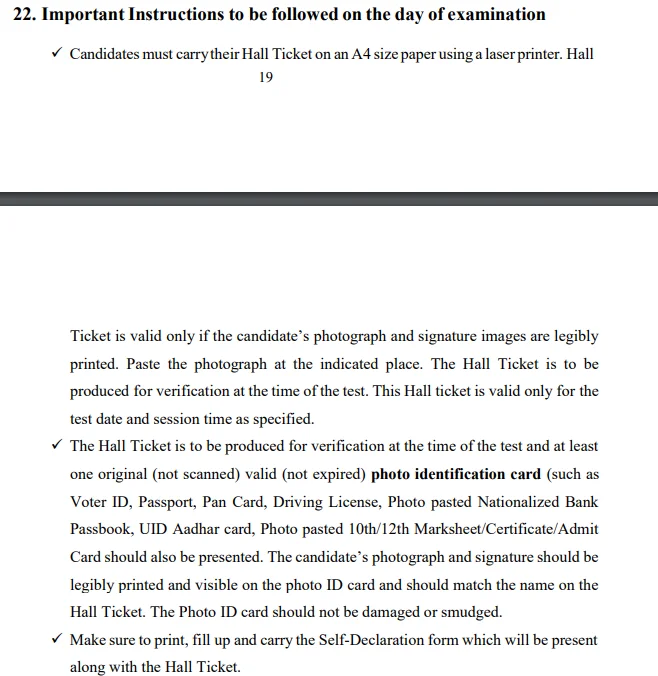
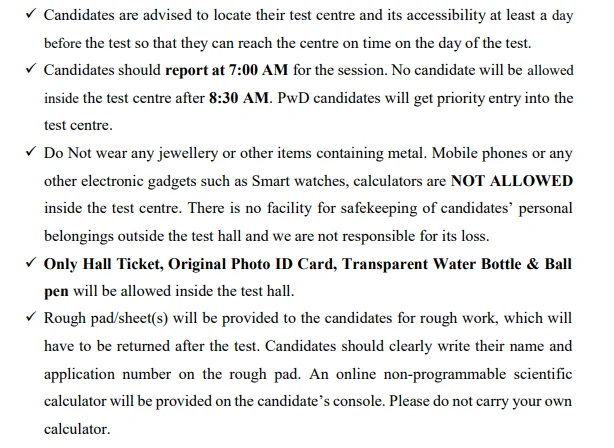
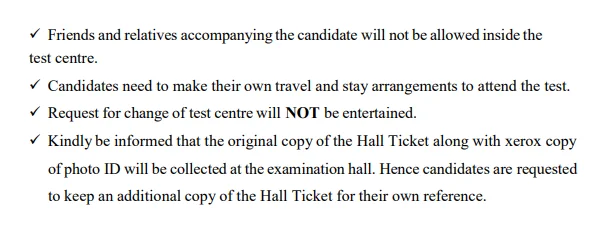
How SelfStudys Can Help You Ace The Exam With IAT Mock Test Series?
Our team of highly professional experts is committed to providing you with the best resources with which you excel in this competitive examination. Through the IISER mock test 2025, we focus on connecting the gap between your theoretical knowledge and exam performance. Below are some points that explain how our platform can help you tackle the IISER Aptitude Test.
- We design the mock test for IISER very carefully so that it replicates the exam structure, format, difficulty level, etc. By attempting them, you can have an experience of the real exam as well as get familiar with the pressure of the test. This environment will help you in efficient time management and also reduce any anxiety which will ultimately enhance your performance during the actual exam day.
- Subjects like Physics, Chemistry, Biology, and Maths are covered properly in our IAT mock test series. The subject-wise feature of our platform provides you with a balanced preparation strategy across each subject. With the attempts at these mock tests, you can make sure to cover all the subjects, leave no gap in your knowledge, and boost your confidence in all areas.
- Attempts at the IISER online mock test free on our website not only give you the score but also the analysis of your performance in detail. In this analysis, you will receive insights into your strengths and weaknesses, time spent on each section, types of mistakes that you made, and so on. With such feedback, you can focus on your weaker areas and make any changes in your study plan accordingly.
- One of the main advantages of taking the IISER mock test or solving the IISER PYPs is that you can track your progress over time. When you attempt them at regular intervals, you can see improvements in your score, speed, accuracy, etc. Through this tracking of your progress, you can stay motivated to work hard and check whether your preparation is on the right track or not.
- By attempting the IISER mock test free consistently, you will start to notice the topics that are tested again and again as well as the areas that require more attention. Our mock tests will not only help you in getting familiar with the question pattern of the exam but also highlight all the important topics. With the help of this targeted information, you can focus your study efforts on the most crucial areas and increase your chances of scoring high.
- We aim to make access to the IAT mock test quite easy for you at any time and from anywhere. These mock tests are available online and you can practice with them at your own pace and schedule. It doesn’t matter if you are a morning or night person, you can attempt the mock tests whenever you want to according to your preparation strategy.
- SelfStudys offers you a vast collection of the IISER mock test 2025 in which the questions are updated on a regular basis. This is done to showcase any changes in the patterns and trends of the exam. With this variety of tests, you can attempt them as many times as you want and prepare yourself thoroughly for every aspect of the examination.
- The most significant benefit of our mock test for IISER is that they are available totally free of cost. The SelfStudys’ experts believe in making the best preparation tools accessible to every user, no matter their financial situation. Through this cost-free resource, you can give your best effort in exam preparation.







 Profile
Profile Signout
Signout










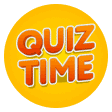 Quiz
Quiz
 Get latest Exam Updates
Get latest Exam Updates 










